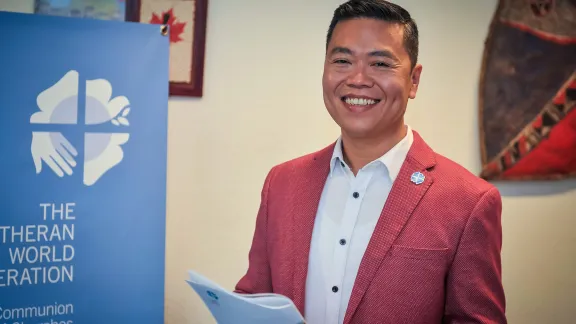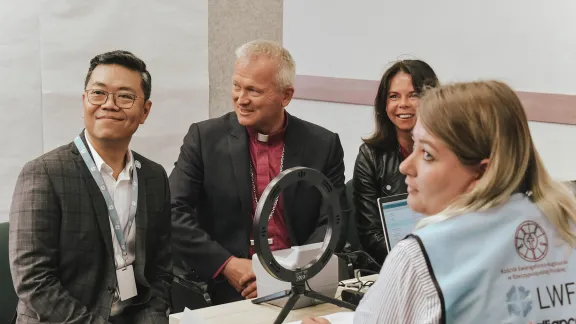"Local people are usually the first providing aid”

Mr Allan Calma is the LWF World Service Global Humanitarian Coordinator. Photo: LWF/S. Gallay
(LWI) - Allan Calma, Global Humanitarian Coordinator of The Lutheran World Federation (LWF) humanitarian arm, World Service, was visiting another LWF country program when the most recent emergency broke out. Days after Russia invaded Ukraine, he was on a flight to Warsaw. For the past five months, Calma together with the Evangelical Church of the Augsburg Confession in Poland (ECACP), an LWF member church, has set up a new humanitarian country program in Poland.
On the occasion of World Humanitarian Day, he talks about his motivation, what makes the refugee crisis caused by the war in Ukraine unique, and about the silent heroes in many emergencies.
How much time did you have to prepare for your current mission in Poland?
I was pulled out of a mission in South Sudan when the Russian military invaded Ukraine. So basically, I came back to Geneva in the morning to get another set of clothes, and in the afternoon, I flew to Warsaw. It was a change from 48 degrees to –3 in one day.
Is this emergency different from the ones you have seen in the past?
Yes, very much so. I think this emergency has continued to challenge humanitarians in rethinking how to effectively help displaced people. For one, here in Poland and many European countries, the host government has given refugees the right to work and has even taken them into their social services.
As humanitarians, we have always highlighted these two issues as the main challenges to a successful refugee response. Now we can finally show how much we can do if we have this kind of support from the host government.
What is easy, what is challenging?
It is easy to fall in love with Poland and its people. What I like the most is meeting the people we seek to assist – it is hard hearing their stories, how they fled, how they left behind their lives, but it is also good to hear their stories of resilience. Particularly for this assignment, I really appreciated how locally-led this response has been. How the humanitarian arm of LWF, World Service, has been working hand in hand with our member church (ECACP) and its parishes across Poland.
The challenge is to navigate through competing and sometimes even conflicting strategies and approaches of humanitarian actors. On the one hand, we need new ways of doing things, as the context in this emergency is quite different from others we have dealt with, on the other, we need to be able to apply learning from previous emergencies.
Can you give an example?
The refugees from Ukraine are very mobile, and they have been free to move around Europe. Also, Poland is a stable country with a robust economy. Usually, in a refugee crisis, the first thing we need to provide is food and basic relief goods, but that was not so necessary in this context. Of course, we had places where we distributed food and water, like border crossings, train stations, and transit areas, but the refugees would only take what they needed at the moment and move on. Multipurpose cash assistance is definitely the most appropriate way to help in this situation. We have a lot of experience with this kind of aid already but need to make sure we coordinate well with other aid agencies, to avoid duplication.

Allan Calma (on the right) from LWF World Service and Bishop Marcin Hintz (on the left) of the Diocese of Pomerania-Greater Poland at the launching of the Cash Assistance Enrolment Center in Gdansk, Poland. Photo: LWF/Maxim SARYCHA
What does World Humanitarian Day mean to you, and why is it important?
It is about people helping people. About the unsung heroes. It is important to take the time to acknowledge their efforts.
Who are the unsung heroes in this crisis?
Definitely the people in Poland. It wasn’t the government nor the non-governmental aid organizations who first took care of the refugees, it was ordinary people in the country who decided to do something to support them. They opened their homes, cooked meals, volunteered to be guides at train stations, helped protect the most vulnerable at the border crossings. Since I have been here, I have met so many wonderful people who I later found out were hosting refugees in their homes – they never tell you about it or brag about it, you just find out from others.
It wasn’t the government nor the aid organizations who first took care of the refugees, it was ordinary people in the country who decided to do something to support them.
– Allan CALMA, LWF Global Humanitarian Coordinator
This I have seen in humanitarian crises all over the world: The local people are usually the first providing aid. This is why it is important that we continue to strengthen local capacities in responding to and being more resilient against emergencies. Also, in every refugee crisis, we need to remember the importance of supporting both the refugees and the host communities.
If you had one wish on World Humanitarian Day, what would it be?
That one day in the future we don’t have to celebrate humanitarians as if they are of a different breed, but that everyone is celebrated as a humanitarian. I would like to see humanitarianism go beyond being a person to a movement.
LWF’s humanitarian arm World Service is present across 19 programs in 25 countries in Africa, Asia, Europe, Latin America, the Caribbean and the Middle East. LWF World Service works in the midst of some of the most intractable and challenging humanitarian and development situations globally, which are unstable, and often impacted by violence and unrest.
In the Ukraine emergency, LWF is responding directly through a humanitarian program in Poland, and through its local member churches in Poland, Hungary, Romania, and the Slovak Republic. Together with the German Evangelical Lutheran Church of Ukraine, an LWF member church, LWF explores possibilities to support people in Ukraine directly in the district of Chernihiv, northern Ukraine. On the global level, LWF joins in worldwide advocacy for peace, and the protection of displaced and vulnerable persons.


